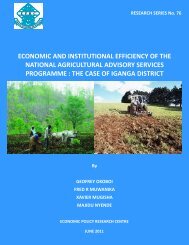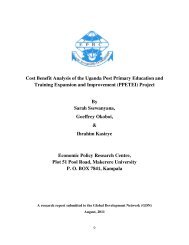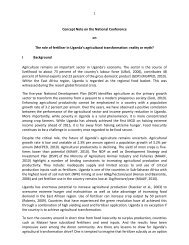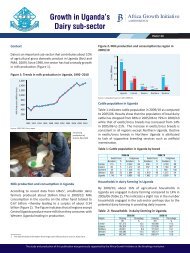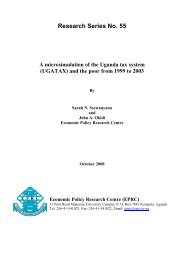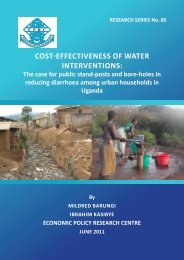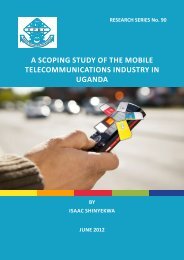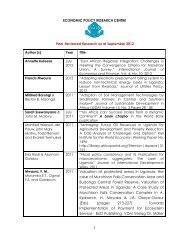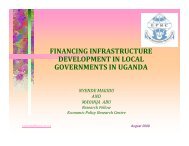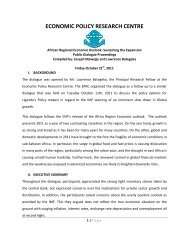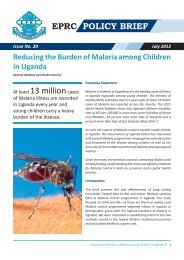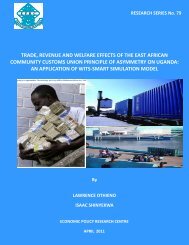The Political Context of Financing Infrastructure Development in ...
The Political Context of Financing Infrastructure Development in ...
The Political Context of Financing Infrastructure Development in ...
You also want an ePaper? Increase the reach of your titles
YUMPU automatically turns print PDFs into web optimized ePapers that Google loves.
<strong>The</strong> <strong>Political</strong> <strong>Context</strong> <strong>of</strong> <strong>F<strong>in</strong>anc<strong>in</strong>g</strong> <strong>Infrastructure</strong> <strong>Development</strong> <strong>in</strong> Local Government<br />
his/her constituency, which itself is healthy, but compromises the oversight functions s<strong>in</strong>ce<br />
each councillor ma<strong>in</strong>ly cares for what <strong>in</strong>frastructure is put <strong>in</strong> his or her constituency. This<br />
notwithstand<strong>in</strong>g, the oversight function on the <strong>in</strong>frastructure development at the local level<br />
legally lies with the local councils. In this regard, the lessons from Uganda are that it has made<br />
laws and regulations that legally empower local councils, but legal niceties are not enough<br />
s<strong>in</strong>ce they may not be implemented, yet the spirit <strong>of</strong> these laws may be political rather than<br />
either legality or democracy. It should be noted that the local councils <strong>in</strong> some <strong>in</strong>stances<br />
even lack capacity to oversee <strong>in</strong>frastructure development “objectively” either due to lack <strong>of</strong><br />
technical skills/knowledge or for sheer partisan <strong>in</strong>terests.<br />
In the wake <strong>of</strong> re-<strong>in</strong>troduction <strong>of</strong> partisan politics <strong>in</strong> 2005, 10 the local government politics<br />
and oversight functions <strong>of</strong> Local councils have s<strong>in</strong>ce changed. <strong>The</strong> focus is more on partisan<br />
considerations rather than objective <strong>in</strong>frastructure development oversight functions. This is<br />
not only limited to local councils but also parliament. For parliament, this is compounded by<br />
existence <strong>of</strong> party caucuses especially the NRM caucus. Whenever there is a controversial<br />
issue <strong>in</strong> Parliament that requires the August house to exercise its oversight functions, the<br />
tendency is to convene an NRM caucus meet<strong>in</strong>g before the issue is tabled <strong>in</strong> parliament. What<br />
normally happens <strong>in</strong> the caucus meet<strong>in</strong>g is to “beat” the NRM MPs <strong>in</strong> l<strong>in</strong>e so that when <strong>in</strong><br />
the house they do not oppose the party position even where it is not only <strong>in</strong> the <strong>in</strong>terest <strong>of</strong><br />
the country but also necessary for them to play their oversight functions. In this respect the<br />
crucial decisions are made at party caucus level rather than on the floor <strong>of</strong> parliament which<br />
only endorses. It is important to note that this situation reverberates to the local councils.<br />
2.3.2 Emerg<strong>in</strong>g Policy Issues<br />
As the political tempo changes, the hitherto devolution which was pivotal <strong>in</strong> empowerment <strong>of</strong><br />
local councils to exercise oversight functions, is steadily be<strong>in</strong>g eroded. <strong>The</strong> 2005 Amendments<br />
to the Local Governments Act <strong>of</strong> 1997, removed the Chief Adm<strong>in</strong>istrative Officers (CAOs) and<br />
Municipal Town Clerks from the ambits <strong>of</strong> District Councils and Municipal Councils and placed<br />
them under the central government. Up until then, these <strong>of</strong>ficers, who are the account<strong>in</strong>g<br />
<strong>of</strong>ficers <strong>in</strong> their respective councils, were removed from the jurisdiction <strong>of</strong> the District Service<br />
Commission (DSC), a statutory body that was responsible for appo<strong>in</strong>t<strong>in</strong>g them. Accord<strong>in</strong>g to<br />
Local Governments Act cap 243, they are now appo<strong>in</strong>ted by the Public Service Commission<br />
(PSC) which is a central government agency. <strong>The</strong>se <strong>of</strong>ficers and their deputies can be<br />
transferred to any part <strong>of</strong> the country which was not the case when they were under the DSC.<br />
<strong>The</strong> implications <strong>of</strong> this shift <strong>in</strong>clude the follow<strong>in</strong>g:<br />
10 Uganda was s<strong>in</strong>ce 1986 when NRM came to power under the “Movement System”, where political parties were not allowed to operate.<br />
After the referendum <strong>in</strong> 2005, political parties were re-stored. But it would appear that the so-called “<strong>in</strong>dividual merit” which was touted<br />
<strong>in</strong> the Constituency Assembly (CA) elections <strong>in</strong> 1994, and the pronouncements there<strong>of</strong> by the president that “we have defeated them”,<br />
still persist. This is because the current talk even when political parties have been legally freed, where NRM is regarded as a political party,<br />
the supporters <strong>of</strong> NRM still talk and reflect themselves as the Movement versus political parties.<br />
24<br />
Economic Policy Research Centre - EPRC




